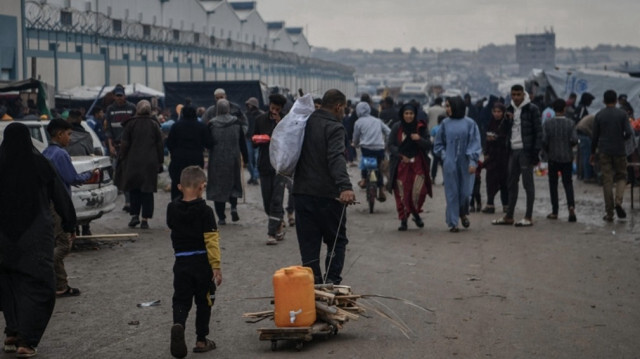
'It is traditionally place where poorest in Gaza Strip used to live, lacking infrastructure, basics,' says Philippe Lazzarini
The southern Gazan city of Rafah is "not the place to host" over 1 million displaced Gazans as it lacks infrastructure, the head of the UN agency for Palestinian refugees (UNRWA) said on Thursday.
Noting that he just returned from his third Gaza visit since the conflict began on Oct. 7, Philippe Lazzarini said in a press conference on the sidelines of the Global Refugee Forum in Geneva: "Every time I go back, I think it cannot get worse. But every time I witness more misery, more grief and sadness and I have the feeling that Gaza is not really a habitable place anymore."
Israel, in response to the Oct. 7 attack by Palestinian group Hamas, launched air and ground attacks on the besieged enclave, killing more than 18,700 Palestinians, mostly civilians, and forced some 1.9 million people to flee their homes.
Lazzarini said he stayed in Rafah, which became "epicenter of the displacement" of Gazans.
"Rafah has quadrupled its number of people overnight," he said, adding: "It is traditionally a place where the poorest in the Gaza Strip used to live, lacking the infrastructure and the basics. I'm saying this because it is not the place to host more than 1 million people, and certainly not the entire Gaza Strip."
To explain the overcrowding in Rafah, which borders Egypt, he said he visited a UNRWA warehouse, which hosts 30,000 people, and compared to his last visit there were "tens of thousands of people outside."
"The lucky ones are those who have a place inside our premises, especially now that winter has started," the UNRWA chief said. "Everywhere you look, is congested with makeshift shelters. Everywhere you go, people are desperate, hungry and terrified."
Lazzarini said he is shocked by the" ever-increasing levels of de-humanization, the lack of empathy and humanity; the fact that people can laugh, cheer, and mock any type of wrongdoing that we observe in this war."
- West Bank faces 'highest levels of violence' in nearly 2 decades
Commenting on situation in the West Bank, Lazzarini said there is "no single day" without an incursion, or a security operation leading to the killing of Palestinians, warning that the territory is facing "the highest levels of violence in nearly two decades" with record high fatalities, injuries and arrests.
UNRWA began to observe some displacement of Palestinians in West Bank, as well as "significant and increasing" settler violence including the use of firearms.
"We all know that a lot of arms now have been distributed in the West Bank," he said.
He warned about an "economically a perfect storm in the making" in the territory due to lack of jobs in Israel.
He said only 39% of the UN flash appeal of $1.2 billion for the occupied Palestinian territory, launched in October, is funded.
Several Western leaders and officials have warned that Israel must act to stop violence by Israeli settlers against Palestinians in the West Bank, which has increased since Oct. 7.

